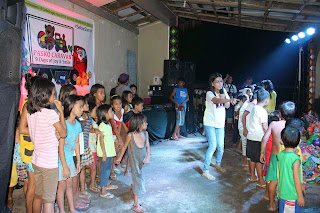By Dominic I. Sanchez
ZAMBOANGA CITY - “Hoy!
Umuwi na kayo!” (Hey! Go back to wherever you came from!)
Lydia struggled with tears as she
shares how passers-by at the evacuation center in Sta. Maria Elementary School
treated them and the other displaced persons currently sheltering there. The
jests would be followed by mocking laughter. As if they chose to be here; as if
they still had a home to go back to.
In addition to physical difficulties
while at the evacuation centers such as the lack of potable water, light,
closed bathrooms for women, and numerous others, emotional abuse towards IDPs
is also rampant.
On December 18, one hundred days since
the start of the conflict in Zamboanga City, an inter-agency/organization
communications team composed of personnel from the City Information Office
(CIO), Philippine Information Agency (PIA), United Nations Office for the
Coordination of Humanitarian Affairs (UN-OCHA) and International Organization
for Migration (IOM) visited the evacuation center and dialogued with the IDPs
there.
Lydia and several others were very
emotional during the discussion.
Annalie shared that when she visited a
health center, she sensed a feeling of hostility from one of the personnel.
“Hindi pa ba kayo uuwi?” (Won’t you go home yet?) the personnel would
condescendingly say.
“Binubully kami, para kaming hindi mga
tao,” (we are bullied, as if we’re less than human) Annalie said.
Not even the children were spared.
Juliet, a mother, shared that her
children would also suffer similar treatment from classmates.
“Ang tawag sa kanila mga ‘bakwits.’
Pinaglalait-laitan sila. Lagi silang binubully ng mga classmates nila; ayaw na
ng mga anak kong pumasok dahil nahihiya na sila,” (They are taunted, teased as
“bakwits”. Their classmates always bully them. My children would refuse to go
to school anymore because they are ashamed) said Juliet.
But the truth is, as much as those who
constantly demean them, IDPs are desperate to go back home to their
communities. The difficulties and uneasiness can sometimes be too unbearable.
“Kailan po ba kami makakauwi?” (when
can we go back home?) they were one in asking.
The communications team clarified that
IDPs cannot remain at the evacuation centers since the living conditions there
are not encouraging. Eventually, they will be transferred to temporary shelters
in Tulungatung, Taluksangay and at the Zamboanga Grandstand.
Billy Jamisdamin II from the IOM
explained that currently, there are still over 25,000 IDPs scattered in the
different evacuation centers. “Pero itong numero bumababa. Ibig sabihin ay
unti-unti nang tinatransfer ang mga IDPs sa mga temporary shelters, at mas maayos
dun kaysa dito.” (But this number is decreasing. What it means is that IDPs are
being transferred to their temporary shelters, which are much better than the
evacuation centers.)
The IDPs will be temporarily relocated
to spacious bunkhouses at the resettlement sites, which is far better than the
tents where several people cram together.
Moreover, IDPs will have opportunities
to participate in cash for work, cash for food and other livelihood programs,
minimizing their dependence on relief goods.
Eventually, perhaps in a matter of six
to eight months to a year, they will be able to return to their homes and
communities in Rio Hondo, Mariki, and in some parts of Talon-Talon (where
houses were totally destroyed) after these areas will have been reconstructed.
“The government will build back better
communities for you. This means that your areas will already have better
infrastructures and other amenities once you return,” said City Information
Officer Sheila Covarrubias. “The reconstruction is a high priority, which means
that the reconstruction will begin soon.”
Meanwhile, Covarrubias assured the IDPs
that their concerns and difficulties will immediately be brought to the
attention of the concerned agencies.
“Huwag na sana nating payagan na maulit
ito,” (we should not let this happen again) pleaded Juliet.
In the meantime, this being only a few
days before Christmas, the IDPs are requesting for one more thing: “noche
Buena.”
“Klarong-claro po na hindi pa talaga
kami makauwi ngayong Pasko,” requested Jimmy. Pero kung pupuwede po sana, may
magandang puso na paghandaan kami ng Noche Buena.” (We can’t go home this
Christmas, but hopefully, someone would share a Christmas eve meal with us.) (PIA9)
.jpg)







